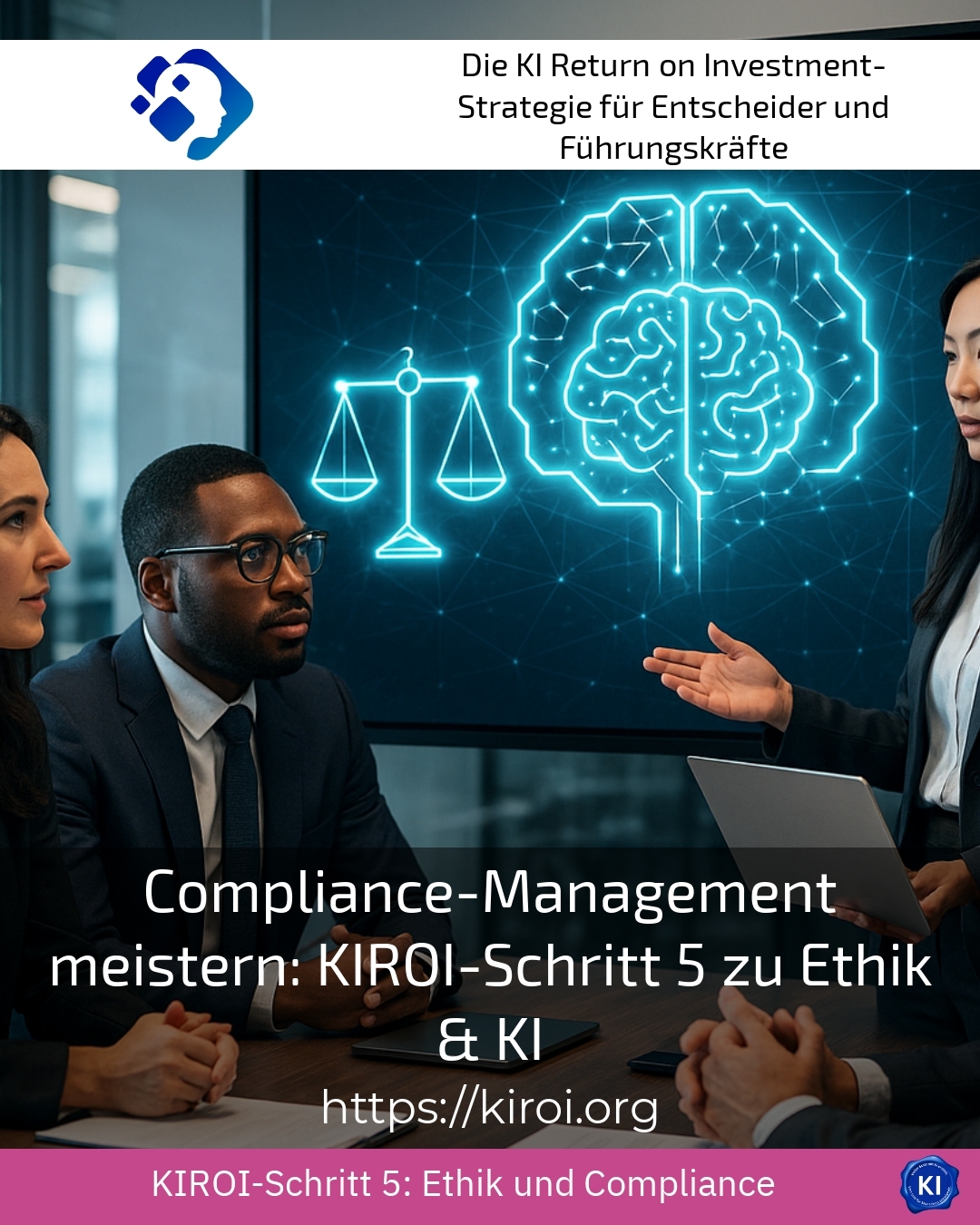Compliance management is essential today in order to protect companies from risks and achieve long-term success. In the fifth step of the KIROI model for ethical leadership and the use of AI, the focus is on systematically mastering compliance management. This is not just about complying with rules, but also about a corporate culture that puts ethical values and integrity at the centre.
Compliance management as the basis for responsible leadership
Companies today are faced with a wide range of regulatory requirements. Compliance management encompasses the structural implementation of legal requirements and internal guidelines. This applies to areas such as data protection, corruption prevention and occupational safety. Strong compliance management not only helps to avoid legal sanctions, but also to secure the trust of customers and partners.
The financial sector offers a practical example of this: banks implement compliance systems that combine money laundering prevention with strict internal control mechanisms. This enables irregular transactions to be recognised at an early stage and protects the company's image at the same time. Similarly, service companies implement comprehensive anti-corruption guidelines to ensure fair business relationships. Checklists on occupational safety and regular training courses also ensure compliance with health standards in manufacturing companies.
AI and compliance management: challenges and opportunities
Artificial intelligence is an innovative tool that optimises many processes. At the same time, the use of AI brings with it new compliance risks, for example in terms of data protection or the traceability of decisions. In KIROI Step 5, it is therefore recommended that AI-supported projects be closely interlinked with compliance guidelines.
For example, a retail company that uses AI for supply chain analyses can ensure that all data is processed in accordance with regulations through defined compliance processes. In the healthcare industry, AI systems make it easier to comply with strict data protection regulations. At the same time, continuous monitoring reinforces ethical standards in the use of patient data. A major telecommunications provider integrated AI compliance checks into its IT systems, enabling it to identify and minimise risks at an early stage.
KIROI step 5: Support compliance management in the long term
The fifth step of the KIROI model recognises compliance management as a dynamic process. The implementation of guidelines alone is not enough. Continuous support, the involvement of all employees and the promotion of an open error culture are crucial. In this way, compliance violations are not swept under the carpet, but used as a learning opportunity.
An example from the construction industry shows how safety and environmental standards are successfully communicated and practised through regular on-site training. In a medium-sized trading company, digital tools for monitoring supply chains led to consistent compliance with legal sustainability standards. A service company also used transparent communication channels to sensitise its employees to compliance issues.
BEST PRACTICE with one customer (name hidden due to NDA contract) As part of KIROI Step 5, a leadership development programme was established at a company in the renewable energy sector. Managers received targeted coaching in order to not only control compliance management, but to actively exemplify it. The result was increased employee motivation and a significant reduction in the number of breaches of regulations within a year.
Practical tips for implementation in everyday life
The following strategies are suitable for making compliance management really effective in the company:
- Regular training in clearly understandable language increases acceptance among employees.
- Digital tools facilitate the management of guidelines, documentation and audit processes.
- Open communication channels encourage the reporting of compliance violations without fear of sanctions.
For example, import companies can use digital monitoring systems to ensure that all customs and export regulations are complied with. Service providers benefit from individualised coaching to implement ethical standards. And manufacturing companies use checklists and regular audits in order to permanently comply with safety requirements at their production sites.
My analysis
Compliance management is more than just a formality. It forms the backbone of ethical and successful corporate governance - especially in the context of ethical responsibility and modern technologies such as AI. KIROI Step 5 offers a practice-orientated strategy to not only anchor compliance, but to bring it to life.
The sustainable support of compliance projects strengthens the trust of employees and stakeholders. At the same time, it minimises risks and supports a culture of mindfulness and transparency. Companies that provide impetus in this area benefit in terms of their reputation and competitiveness in the long term.
Further links from the text above:
KIROI Step 5: Successfully support compliance guidelines [2]
What is compliance management? [1]
Compliance strategies: KIROI Step 5 for ethical leadership [6]
For more information and if you have any questions, please contact Contact us or read more blog posts on the topic Artificial intelligence here.















